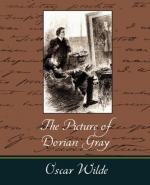he is much more to me than a model or a sitter.
I won’t tell you that I am dissatisfied with
what I have done of him, or that his beauty is such
that art cannot express it. There is nothing
that art cannot express, and I know that the work
I have done, since I met Dorian Gray, is good work,
is the best work of my life. But in some curious
way—I wonder will you understand me?—his
personality has suggested to me an entirely new manner
in art, an entirely new mode of style. I see
things differently, I think of them differently.
I can now recreate life in a way that was hidden from
me before. ’A dream of form in days of
thought’—who is it who says that?
I forget; but it is what Dorian Gray has been to me.
The merely visible presence of this lad—for
he seems to me little more than a lad, though he is
really over twenty— his merely visible
presence—ah! I wonder can you realize
all that that means? Unconsciously he defines
for me the lines of a fresh school, a school that
is to have in it all the passion of the romantic spirit,
all the perfection of the spirit that is Greek.
The harmony of soul and body— how much
that is! We in our madness have separated the
two, and have invented a realism that is vulgar, an
ideality that is void. Harry! if you only knew
what Dorian Gray is to me! You remember that
landscape of mine, for which Agnew offered me such
a huge price but which I would not part with?
It is one of the best things I have ever done.
And why is it so? Because, while I was painting
it, Dorian Gray sat beside me. Some subtle influence
passed from him to me, and for the first time in my
life I saw in the plain woodland the wonder I had
always looked for and always missed.”
“Basil, this is extraordinary! I must
see Dorian Gray.”
Hallward got up from the seat and walked up and down
the garden. After some time he came back.
“Harry,” he said, “Dorian Gray
is to me simply a motive in art. You might see
nothing in him. I see everything in him.
He is never more present in my work than when no
image of him is there. He is a suggestion, as
I have said, of a new manner. I find him in
the curves of certain lines, in the loveliness and
subtleties of certain colours. That is all.”
“Then why won’t you exhibit his portrait?”
asked Lord Henry.
“Because, without intending it, I have put into
it some expression of all this curious artistic idolatry,
of which, of course, I have never cared to speak to
him. He knows nothing about it. He shall
never know anything about it. But the world might
guess it, and I will not bare my soul to their shallow
prying eyes. My heart shall never be put under
their microscope. There is too much of myself
in the thing, Harry—too much of myself!”
“Poets are not so scrupulous as you are.
They know how useful passion is for publication.
Nowadays a broken heart will run to many editions.”
“I hate them for it,” cried Hallward.
“An artist should create beautiful things,
but should put nothing of his own life into them.
We live in an age when men treat art as if it were
meant to be a form of autobiography. We have
lost the abstract sense of beauty. Some day I
will show the world what it is; and for that reason
the world shall never see my portrait of Dorian Gray.”




